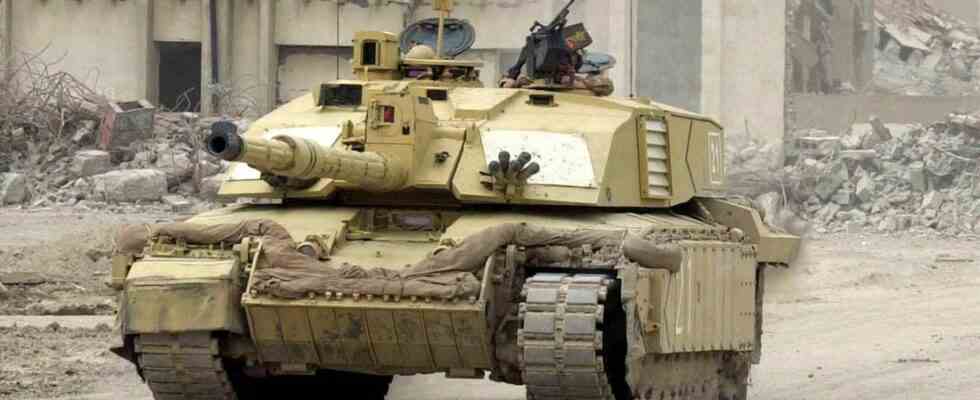In November 2021, British Prime Minister Boris Johnson sat in a committee room in Westminster to answer questions from the Liaison Committee about his work as Prime Minister. Tory MP Tobias Ellwood, a former captain and chairman of the Defense Committee, asked Johnson in an almost annoyed tone why he was reducing troop levels and not investing in war equipment. Doesn’t he see the obvious threat on the Russian-Ukrainian border? “We have to recognize that the days of land battles with tanks on European soil are over,” Johnson said.
Two prime ministers and an invasion later, the kingdom became the first Western country to decide to send state-of-the-art main battle tanks to Ukraine. It wants to support the Ukrainian army in its land fight on European soil, which it was forced into by Russia four months after Johnson’s appearance in the Committee room.
14 Challenger-2– Tanks should be brought to Ukraine as soon as possible, together with ammunition and spare parts. There is also training for the Ukrainian armed forces: The challenger 2 is considered a modern weapon of war, which differs in operation from the tanks that Ukrainian soldiers are used to. In videos, the British army advertises the tank, which can reach speeds of up to 60 km/h, as if it were a fancy off-road vehicle from the PS show “Top Gear”. the challenger 2 is something like the pride of the army.
Johnson’s successor, Rishi Sunak, called Ukrainian President Volodymyr Zelenskiy on Saturday and assured him that the tanks would be delivered along with other equipment. “The two agreed to seize this moment by expediting military and diplomatic support to Ukraine,” a Downing Street spokesman said afterwards. A cumbersome paraphrase for: now or never.
The British Army? “Will be scrapped and broken saved”
At the beginning of last week, a Western government representative said in a background discussion with journalists that Ukraine now needs heavy military equipment such as tanks, otherwise it would not be possible to reclaim land. In addition, the British and German-made tanks in particular offer the advantage that they are superior to the Russian tanks. The 62.5 ton heavy challenger 2 has been in service since 1994 and is intended to destroy other tanks. It was used in Bosnia and Herzegovina, in Kosovo and in Iraq and, at least that’s what the British army leaves on theirs home page know, has never been defeated in battle.
According to official figures, the four armored divisions of the British Army each have 56 Challenger-2-tanks, so a total of 224. The number of tanks of this type has hardly changed in recent years: 2016 the Department of Defense said there were 227 challenger 2 owned by the army. Apart from that, however, the criticism of the state of the army in the kingdom is similar to that in Germany: “The armed forces are ready for scrap and have been saved,” wrote the journalist Max Hastings recently in the Times. Hastings, 77, is the author of several award-winning military history books. And he was editor-in-chief DailyTelegraphwhen the paper sent a young correspondent named Boris Johnson to Brussels.
A general complains about a lack of investment
Hastings writes that Johnson’s twisted vision of “Global Britain” has primarily led to the Ministry of Defense investing most of its money in the Navy, with a view to Indo-Pacific alliances, instead of strengthening NATO troops in Eastern Europe, for example. The tone in the committee rooms in the British Parliament was also rather worried: on Wednesday last week, when the Defense Committee met with its chairman Tobias Ellwood for around three hours, the invited General Sharon Nesmith complained that it had been closed for the past few years little has been invested in manufacturing facilities. After almost two years of war in Ukraine, the army is faced with the problem that the production of supplies is becoming increasingly difficult. Reform programs that have actually already been decided are also at risk.
Last year, Defense Secretary Ben Wallace had around 44 billion pounds at his disposal, the equivalent of almost 50 billion euros. Extrapolated, the British defense budget corresponds to 2.1 percent of gross domestic product. Short-term Prime Minister Liz Truss had announced that the value would be increased to three percent in the coming years. By 2030, Wallace was satisfied that this would result in a sum of around £100 billion.
But government promises have had a rather short shelf life in London recently, which is why Wallace said shortly after Truss’ resignation that he was currently only “looking from budget to budget”. Truss’ successor Rishi Sunak has so far avoided commenting on the matter in concrete terms. However, he will not be able to do this for too long: the next budget plan will be presented in just under two months.

